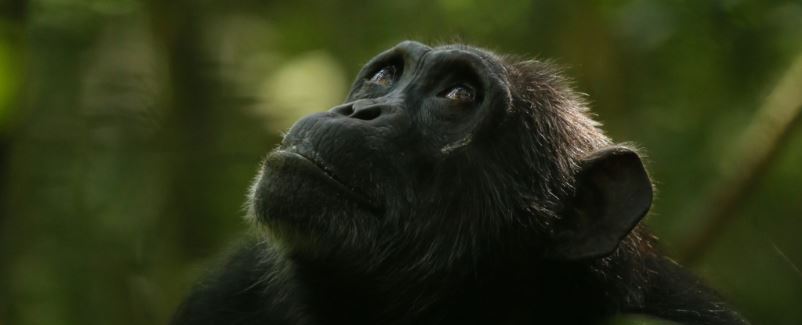


 3:52:33
3:52:33  2023-10-28
2023-10-28  1028
1028

Humans are outliers for the way many of us, along with a handful of toothed whale species and Asian elephants, will live well beyond our reproductive years.
The rarity of menopause among animals has long puzzled researchers, and so has its origin since our close primate relatives didn't appear to share this marker of fertility's end.
Or so we thought. Researchers have discovered a remote population of wild chimpanzees in Uganda do in fact live decades after they go through menopause, displaying similar hormonal changes as those seen in humans.
University of California evolutionary anthropologist Brian Wood and colleagues analyzed 21 years of demographic and behavioral data on the Ngogo community of wild chimpanzees in Kibale National Park in southwest Uganda, to calculate their fertility rates and survivorship.
Chimpanzees are, along with bonobos, humans' closest living relatives, and the Ngogo community (Pan troglodytes schweinfurthii) have been closely studied since 1995.
Similar to humans but different from other chimpanzee populations, Ngogo chimpanzees often continued to live many years past the end of reproduction. Their fertility declined around 30 years of age, with no births observed after 50; some of the chimps survived for 10 or 15 years beyond that.
Human ovaries shut down when menopause kicks in around the age of 50, and like narwhals, orcas, belugas, and short-finned pilot whales – the other menopausal mammals – post-menopausal humans can live healthily for decades longer.
The Ngogo chimpanzees, the researchers calculated, spend about one-fifth of their adult years in a menopausal state, which is around half as long as human hunter-gatherers.
Analyzing five hormones measured in 560 urine samples from 66 females aged 14 to 67 years also showed menopausal chimps went through very similar endocrinal changes as those associated with human menopause. Urine levels of follicle-stimulating hormone and luteinizing hormone increased, while estrogens and progestins dropped.
Studies of captive chimpanzees have found those animals can reproduce up until the final years of their life. Signs of menopause a decade or more before the death of Ngogo's long-lived wild chimpanzees paint a different story.
"New data from less well-known populations have the power to upend assumptions about the life history of even the most familiar species," writes Michael Cant, an evolutionary biologist at the University of Exeter who was not involved in the study but penned an accompanying perspective on the work.
"If chimpanzees evolved to undergo menopause, theories to explain it may need to focus on the similarities between ape and toothed-whale societies," he adds.
Past studies of orcas (Orcinus orca) have suggested menopause may have evolved because of competition for resources in family groups. Called the reproductive conflict hypothesis, it suggests older females stop reproducing because their calves can't compete with offspring born to their adult daughters.
The other leading theory for how menopause evolved is the grandmother hypothesis, which also has evidence from orcas. It suggests older females live past their reproductive years to up the odds of their daughters reproducing and their grand offspring surviving.
However, this is "unlikely to apply to chimpanzees, whose aged females generally live apart from their daughters, as daughters leave their natal groups at adulthood," Wood and colleagues note.
They also note that while the study opens a new page on the evolution of menopause that further studies could fill in, the findings could reflect how past research may have underestimated the lifespan of wild chimpanzees before modern humans started hunting them and logging their habitats.
The Ngogo chimpanzees are in a remote part of Uganda where they have been able to live out their lives longer than most.
Reality Of Islam |
|

A new chip-

A large inf

Choosing th

A new NURBS
 9:3:43
9:3:43
 2018-11-05
2018-11-05
10 benefits of Marriage in Islam
 7:5:22
7:5:22
 2019-04-08
2019-04-08
benefits of reciting surat yunus, hud &
 9:45:7
9:45:7
 2018-12-24
2018-12-24
advantages & disadvantages of divorce
 11:35:12
11:35:12
 2018-06-10
2018-06-10
 6:0:51
6:0:51
 2018-10-16
2018-10-16
 8:21:9
8:21:9
 2018-06-21
2018-06-21
al-hussain (peace be upon him)
 10:18:1
10:18:1
 2022-09-21
2022-09-21
 5:58:12
5:58:12
 2021-12-18
2021-12-18
 8:4:21
8:4:21
 2022-01-08
2022-01-08
 9:50:37
9:50:37
 2023-02-28
2023-02-28
 6:14:3
6:14:3
 2023-01-18
2023-01-18
 11:2:27
11:2:27
 2022-10-06
2022-10-06
 5:41:46
5:41:46
 2023-03-18
2023-03-18
| LATEST |